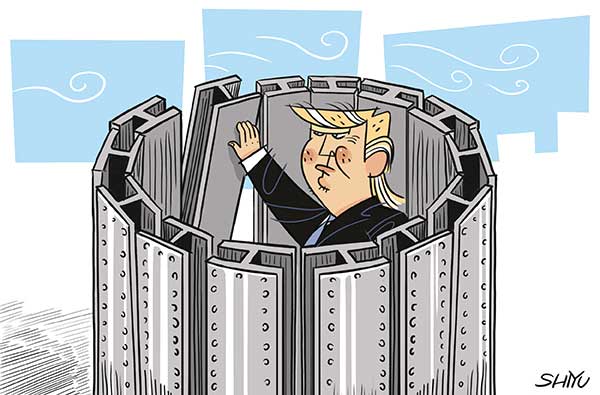Trump trying to fool US public with tariff claims
By Chen Weihua | China Daily | Updated: 2018-03-23 07:57

Anyone who believes that there is unanimous support in the United States for the Trump administration's proposed Section 301 tariffs on China should refer to the House of Representatives hearing on Wednesday when US Trade Representative Bob Lighthizer was grilled.
Lawmakers, many from states which elected Donald Trump as president, expressed the deep anxiety of their constituents about the possible repercussions of tit-for-tat retaliation or even a trade war being triggered by the proposed tariffs on China, which could reportedly be up to $60 billion a year. The biggest concern is the effect they would have on US industries and local economies, and what that would mean for workers, farmers and consumers, especially low-income families.
Major US retailers, from Walmart to Target, voiced similar concerns in their letter to Trump last week, saying the Section 301 action would worsen the inequality in the US and punish working families with higher prices on household basics.
There is no doubt that the Section 301 action and the other US tariffs announced recently will hurt the Americans Trump has pledged to put first.
For example, the tariffs imposed on imported washing machines announced in January will end up as a tax on 97 million US households in the name of protecting 2,400 workers in washing machine factories. And the tariffs on imported solar modules and cells threaten 258,000 workers in the installation sector in the name of saving 2,000 workers in the manufacturing sector, according to the Cato Institute.
Trump's Section 232 tariffs on steel and aluminum imports could result in a net loss of 146,000 US jobs, even without taking into consideration possible retaliation from US trading partners, according to Washington-based consulting group Trade Partnership.
A major disruption in China-US trade would be disastrous for the US. China-US trade supports 2.6 million US jobs, including jobs that Chinese companies have created in the US, according to a 2017 Oxford Economics report.
The report shows that besides supporting US jobs, Chinese manufacturers lowered prices for US consumers, dampened inflation and put more money in their wallets, since for a typical US household earning $56,500 in 2015, trade with China saved these families up to $850 that year.
In 2007, Sara Bongiorni's book, A Year without Made in China: One Family's True Life Adventure in the Global Economy, describing her family's attempt to boycott Chinese made products attracted much attention. While the story might have changed today, because a lot of labor intensive jobs have been relocated from China to countries such as Vietnam and Bangladesh over the past decade with rising labor costs in China, still US consumers shopping in stores such as Walmart and Target would be hurt if China and other developing countries no longer supplied cheap products due to the tariffs.
"The Economic Benefits of US Trade", a 2015 report by the Council of Economic Advisers, shows that compared to a world with no trade, median-income consumers in the US gain an estimated 29 percent of their purchasing power from trade.
But Trump does not want American people to know this. Instead, he has constantly painted US as a victim in global trade. He has never talked about how most manufacturing jobs have been lost to automation, rather than trade, and he has never talked about how the US government has done a poor job of helping workers negatively impacted by trade deals.
Trump has also misled the US people by equating US trade deficits to a loss for the US and a win for its trade partners, despite the fact that almost all economists disagree with such a notion.
It's time to stop Trump and other folk fooling the American people.
The author is deputy editor of China Daily USA. chenweihua@chinadailyusa.com
























